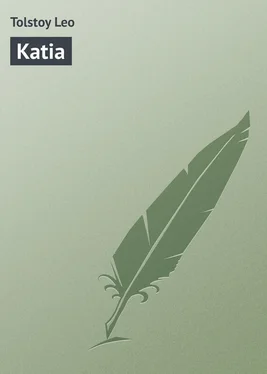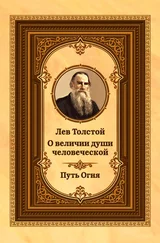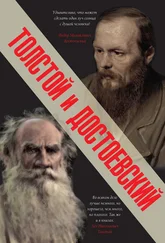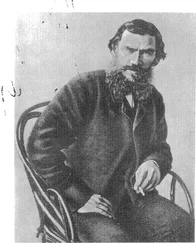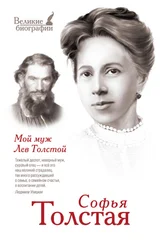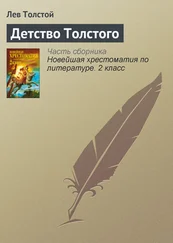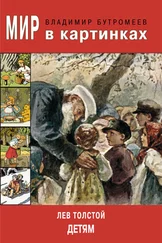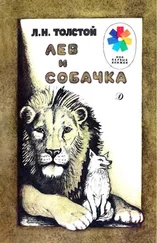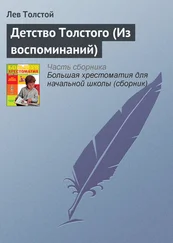Лев Толстой - Katia
Здесь есть возможность читать онлайн «Лев Толстой - Katia» весь текст электронной книги совершенно бесплатно (целиком полную версию без сокращений). В некоторых случаях можно слушать аудио, скачать через торрент в формате fb2 и присутствует краткое содержание. Издательство: Иностранный паблик, Жанр: Русская классическая проза, на английском языке. Описание произведения, (предисловие) а так же отзывы посетителей доступны на портале библиотеки ЛибКат.
- Название:Katia
- Автор:
- Издательство:Иностранный паблик
- Жанр:
- Год:неизвестен
- ISBN:нет данных
- Рейтинг книги:3 / 5. Голосов: 1
-
Избранное:Добавить в избранное
- Отзывы:
-
Ваша оценка:
- 60
- 1
- 2
- 3
- 4
- 5
Katia: краткое содержание, описание и аннотация
Предлагаем к чтению аннотацию, описание, краткое содержание или предисловие (зависит от того, что написал сам автор книги «Katia»). Если вы не нашли необходимую информацию о книге — напишите в комментариях, мы постараемся отыскать её.
Katia — читать онлайн бесплатно полную книгу (весь текст) целиком
Ниже представлен текст книги, разбитый по страницам. Система сохранения места последней прочитанной страницы, позволяет с удобством читать онлайн бесплатно книгу «Katia», без необходимости каждый раз заново искать на чём Вы остановились. Поставьте закладку, и сможете в любой момент перейти на страницу, на которой закончили чтение.
Интервал:
Закладка:
The sound of wheels echoed on the turf and before the door, then I heard on the terrace steady steps, well-known to me, then all was quiet. But it was no longer the old feeling which stirred in me at these familiar footsteps. They came up behind me when I had finished the sonata, and a hand was laid upon my shoulder.
“A happy thought, to play the old sonata!” he said.
I made no answer.
“Have not you had tea?”
I shook my head, without turning towards him, for I did not want him to see the traces of agitation on my face.
“They will be here presently; the horses were a little unruly, and they are coming home on foot, by the road,” he continued.
“We will wait for them,” I said, going out on the terrace, in the hope that he would follow, but he inquired for the children, and went up to see them. Once more, his presence, the sound of his voice, so kind, so honest, dissuaded me from believing that all was lost for me. “What more is there to desire?” I thought: “he is good and true, he is an excellent husband, an excellent father, and I do not myself know what is missing, – what I want.”
I went out on the balcony, and sat down under the awning of the terrace, on the same bench where I was sitting upon the day of our decisive explanation long ago. The sun was nearly down, dusk was gathering; a shade of spring softened the pure sky, where one tiny spark was already gleaming. The light wind had died away, not a leaf or blade of grass stirred; the perfume of the lilacs and cherry-trees, so powerful that one might have thought all the air itself was in bloom, came in puffs over garden and terrace, now faint and now full, making one feel an impulse to close the eyes, to shut out all sight and sound, to banish every sensation save that of inhaling this exquisite fragrance. The dahlias and rose-bushes, yet leafless, stood in still lines in the newly-dug black mould of their beds, lifting their heads above their white props. From afar came the intermittent notes of the nightingales, or the rush of their restless flight from place to place.
It was in vain that I strove to calm myself, I seemed to be waiting and wishing for something.
Sergius came from up-stairs, and sat down beside me.
“I believe it is going to rain,” he said, “they will get wet.”
“Yes,” I replied; and we were both silent.
In the meantime, the cloud, without any wind, had crept slowly and stealthily above our heads; nature was yet more perfectly tranquil, sweet, and still: suddenly one drop fell, and, so to speak, rebounded, upon the linen of the awning, another rolled, a growing ball of dust, along the path; then, with a sound like deadened hail, came the heavy dash of rain, gathering force every moment. At once, as if by concert, frogs and nightingales were silent; but the light plash of the fountain was still heard beneath the beating of the rain, and far off in the distance some little bird, no doubt safe and dry under a sheltering bough, chirped in monotonous rhythm his two recurring notes. Sergius rose to go into the house.
“Where are you going?” said I, stopping him. “It is so delightful here!”
“I must send an umbrella and some overshoes.”
“It is not necessary, this will be over directly.”
He assented, and we remained standing together by the balustrade of the balcony. I put my hand on the wet slippery rail, and leaned forward into the rain, the cool drops falling lightly on my hair and neck. The cloud, brightening and thinning, scattered in shining spray above us, the regular beat of the shower was succeeded by the sound of heavy drops falling more and more rarely from the sky or from the trees. The frogs resumed their croaking, the nightingales shook their wings and began again to respond to each other from behind the glistening shrubs, now on one side, now on another. All was serene again before us.
“How good it is to live!” he said, leaning over the balustrade and passing his hand over my wet hair.
This simple caress acted on me like a reproach, and I longed to let my tears flow.
“What more can a man need?” continued he. “I am at this moment so content, that I feel nothing wanting, and I am completely happy!”
(“You did not speak so to me when to hear it would have made my happiness,” I thought. “However great yours was, then, you used to say that you wished for more of it, still more. And now you are calm and content, when my soul is full of inexpressible repentance and unsatisfied tears!”)
“To me, too, life is good,” said I, “and it is precisely because it is so good to me, that I am sad. I feel so detached, so incomplete; I am always wanting some other thing, and yet everything here is so good, so tranquil! Can it be possible that for you no sorrow ever seems mingled with your pleasure in life? – as if, for instance, you were feeling regret for something in the past?”
He drew away the hand resting on my head, and was silent for a moment.
“Yes, that has been the case with me, formerly, particularly in the spring,” he said, as if searching his memory. “Yes, I also have spent whole nights in longings and fears, – and what beautiful nights they were!.. But then all was before me, and now all is behind; now I am content with what is, and that to me is perfection,” he concluded, with such easy frankness of manner, that, painful as it was to hear, I was convinced that it was the truth.
“Then you desire nothing more?” I questioned.
“Nothing impossible,” he replied, divining my thought. “How wet you have made your head,” he went on, caressing me like a child, and passing his hand again over my hair; “you are jealous of the leaves and grass which the rain was falling on; you would like to be the grass and the leaves and the rain; while I – I enjoy simply seeing them, as I do seeing whatever is good, young, happy.”
“And you regret nothing in the past?” I persisted, with the dull weight on my heart growing heavier and heavier.
He seemed to muse for a moment, keeping silent. I saw that he wished to answer honestly.
“No!” he said, at length, briefly.
“That is not true! that is not true!” I cried, turning and facing him, with my eyes fixed upon his. “You do not regret the past?”
“No!” he repeated. “I bless it, but I do not regret it.”
“And you would not wish to go back to it?”
He turned away, looking out over the garden.
“I no more wish that than I would wish to have wings. It cannot be.”
“And you would not re-make this past? And you reproach neither yourself, nor me?”
“Never! all has been for the best.”
“Listen!” said I, seizing his hand to force him to turn towards me. “Listen! Why did you never tell me what you wished from me, that I might have lived exactly as you desired? Why did you give me a liberty which I knew not how to use? why did you cease to teach me? If you had wished it, if you had cared to guide me differently, nothing, nothing would have happened,” I went on, in a voice which more and more energetically expressed anger and reproach, with none of the former love.
“What is it that would not have happened?” said he with surprise, turning towards me. “There has been nothing. All is well, very well,” he repeated smiling.
“Can it be possible,” I thought, that he does not understand me? “or, worse still, that he will not understand me?” and my tears began to fall.
“This would have happened, – that, not having made me guilty towards you, you would not have punished me by your indifference, your contempt,” I broke out. “What would not have happened is seeing myself, with no fault on my own part, suddenly robbed by you of all that was dear to me.”
“What are you saying, my darling?” he exclaimed, as if he had not understood my words.
Читать дальшеИнтервал:
Закладка:
Похожие книги на «Katia»
Представляем Вашему вниманию похожие книги на «Katia» списком для выбора. Мы отобрали схожую по названию и смыслу литературу в надежде предоставить читателям больше вариантов отыскать новые, интересные, ещё непрочитанные произведения.
Обсуждение, отзывы о книге «Katia» и просто собственные мнения читателей. Оставьте ваши комментарии, напишите, что Вы думаете о произведении, его смысле или главных героях. Укажите что конкретно понравилось, а что нет, и почему Вы так считаете.
